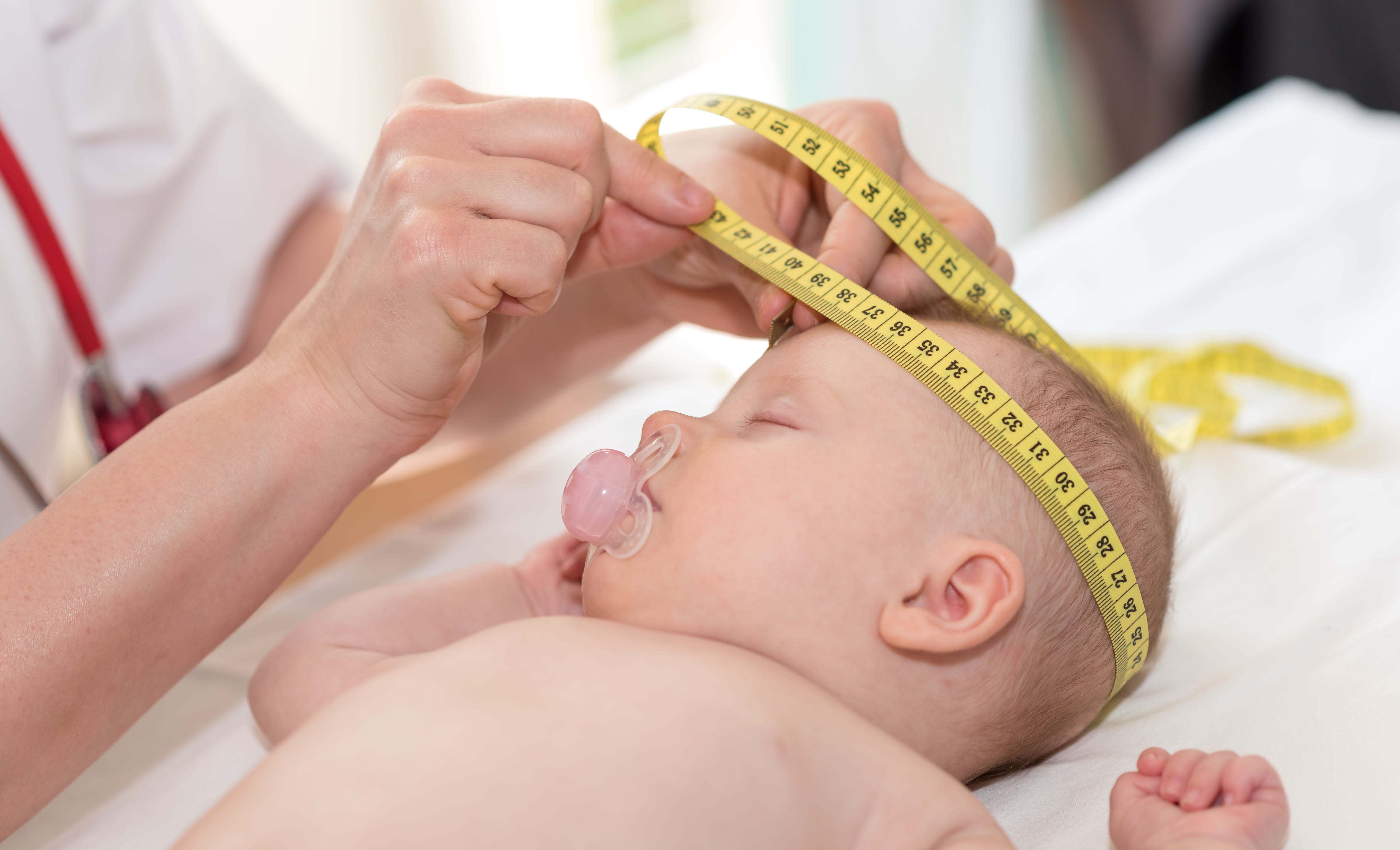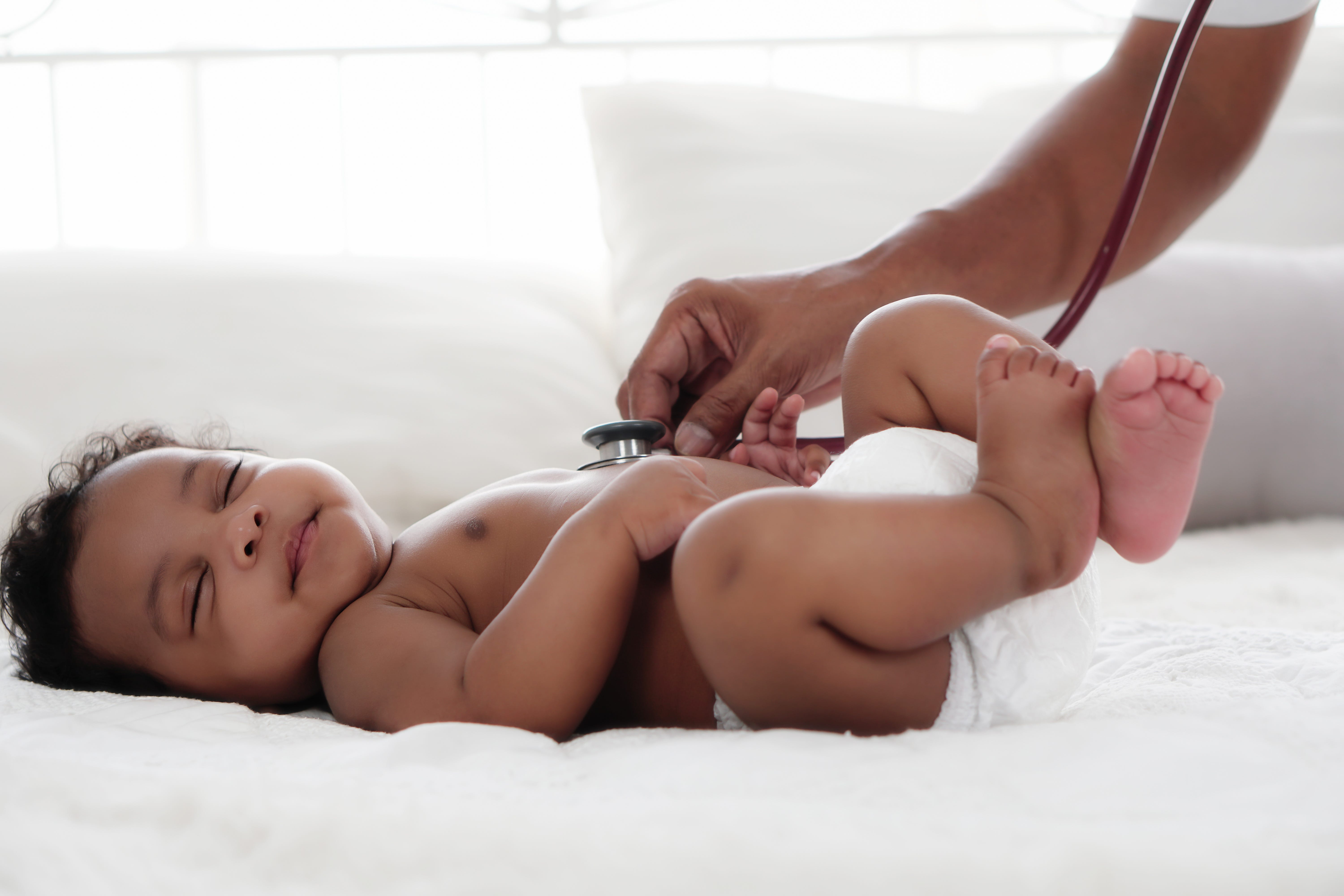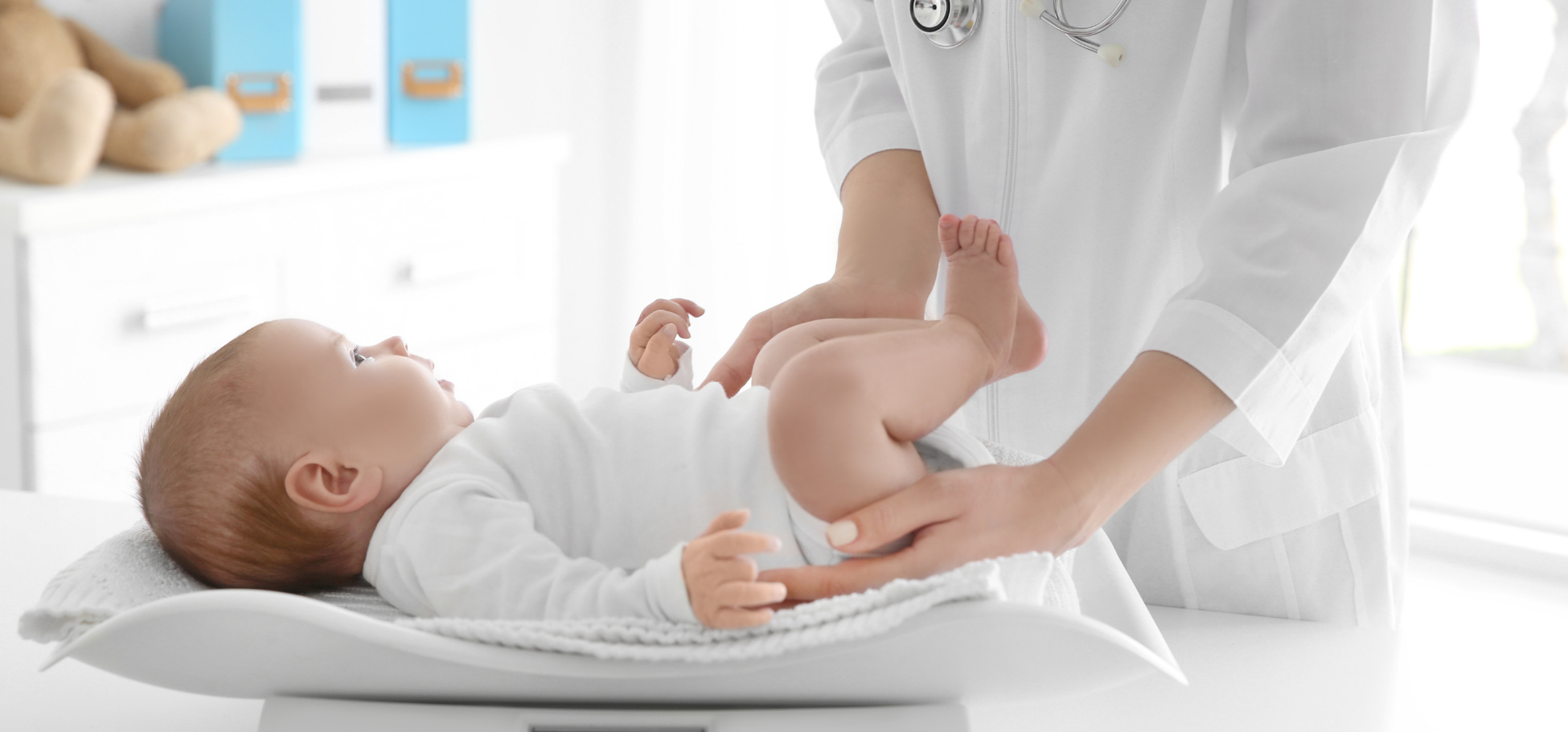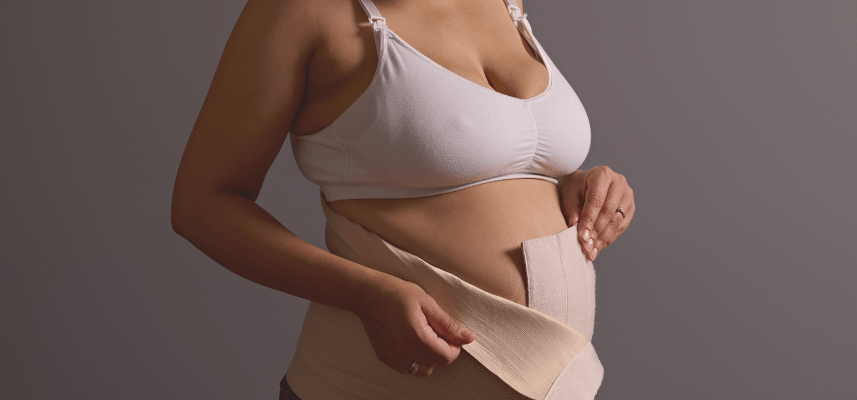Newborn babies typically stay in the hospital between one to four days after they are born. During this time they are seen and examined by a pediatrician each day. The role of the in-hospital pediatrician is to make sure that your baby’s physical exam is okay, that your baby does not have problems with feeding, that he or she does not lose too much weight, that your baby’s jaundice levels are not too high, and answer any questions you might have.
In the past, the doctor who took care of your baby in the hospital was the same doctor who your baby would continue to see for checkups after going home. This is usually no longer the case, so most babies do not meet their pediatrician for the first time until after they are discharged home. Because of this, we recommend that expecting parents try to meet and interview pediatricians ahead of time. Most pediatricians offer a “meet and greet” visit during pregnancy, however, this is not always covered by health insurance. The best way to find a pediatrician is to ask for recommendations from your family members, friends, and neighbors – you’ll often notice that the same doctors’ names will come up over and over again!
When should baby’s first doctor visit be?
Newborn babies should have their first doctor's appointment with their pediatrician within one to two days of coming home from the hospital or within 24 hours of being born via home birth. This first visit is usually in an outpatient office as there are, unfortunately, very few pediatricians who are able to offer in-home checkups in the U.S. Your pediatrician should receive a summary from the hospital you delivered at with your baby’s birth information, weight, and other measurements, physical exams, and jaundice levels before discharge home. It’s a good idea to bring any paperwork from the hospital to your baby’s first doctor visit just in case they have not received this important information about your baby’s first few days of life.
Why is baby’s first doctor visit so important?
The main purpose of your baby’s first checkup is to make sure things are going okay at home, that he or she has not lost too much weight since birth, that there is nothing concerning in the physical examination, to troubleshoot any breastfeeding or other feeding problems, to make sure that your baby has not become too jaundiced, and to counsel parents about topics such as newborn behavior, sleep, expected milestones, vaccines, etc. We’ll explore each of these areas in more detail below.


Feeding: One of the most important parts of your little one’s first visit is to make sure that baby's feeding is going smoothly. If you have any concerns with breastfeeding you should let the pediatrician know during this visit. Breastfeeding issues that new moms might experience around this time include concerns with milk supply, problems with latching, engorgement, pain while breastfeeding, and not being sure how often one’s baby needs to feed. Your baby’s doctor should be able to troubleshoot what is going on and refer you to a lactation consultant for help, if needed, as soon as possible. If your baby is bottle feeding you should make sure to let the doctor know if your baby has any trouble with taking a bottle, tolerating formula, if you have questions about preparing formula, and/or if you need more information about pumping and storing breast milk that is fed by bottle.
Weight: It’s normal for newborns to lose a little weight after they are born, but excessive weight loss, which is defined as losing > 8-10% of birth weight, can be a sign that a baby is not eating enough and is at risk of becoming dehydrated. Your pediatrician will measure your baby's head circumference, weight, and length at this visit, and plot these numbers on a special graph called a “growth curve” to figure out what percentile they are at on a growth chart. Your baby’s growth will continue to be measured and tracked on this growth curve at every pediatrician’s visit.
Physical Exam: Your baby’s doctor will make sure that your baby’s “vital signs,” which include temperature, heart rate, and number of breaths per minute, are normal. She will make sure that your baby’s fontanelles (“soft spots”) are open and that any head swelling from delivery is improving. She will also take a very close listen to your baby’s lungs to make sure there are no breathing problems, and heart to make sure there is not a heart murmur (which can indicate a heart problem). Other important parts of the newborn exam include looking into their eyes with a special light called an ophthalmoscope, examining baby’s mouth to make sure that the palate is intact, assessing for a tongue tie, feeling your baby’s abdomen to make sure it is soft, and making sure that his or her neurological exam and reflexes are normal for a newborn baby. It’s really common for newborns to have rashes and if your baby has a rash the pediatrician will let you know what it is called and when to expect that the rash will disappear.
Jaundice: Jaundice is caused by a buildup of bilirubin, which is a compound our bodies make when red blood cells are broken down. Elevated bilirubin levels cause babies’ skin to become yellow-looking when they are jaundiced. Newborn babies have a tendency to become jaundiced because their ability to rid their bodies of bilirubin is not yet fully developed. Babies can excrete (get rid of) bilirubin in their urine and stool, so the more that babies eat during the first few days to weeks of life, the lower their risk of developing serious jaundice. Pediatricians check babies’ jaundice levels through the skin, with a tool called a transcutaneous bilirubinometer, and/or by sending a few drops of blood obtained from your baby’s heel to a lab.
Most newborn babies with jaundice will be totally fine. However, if bilirubin levels get too high babies are at risk of developing brain damage from a condition called kernicterus. Your doctor will prescribe a special type of light therapy for your baby (phototherapy) if your baby’s bilirubin levels rise too much to prevent kernicterus. Phototherapy treats newborn jaundice by helping babies’ bodies break down bilirubin. Mild cases of jaundice can be treated in the home by having parents put their newborn in either a biliblanket or bilibed. More serious cases of jaundice need to be treated with powerful phototherapy in the hospital setting.
Anticipatory Guidance: One of the most important roles of a pediatrician is to counsel new parents about what to expect as they take care of their newborn. Your pediatrician should cover all of these topics during your baby’s first visit:
- Normal newborn and baby sleep patterns
- How to create a safe sleep environment
- Developmental milestones, i.e. when to expect your baby to start to smile, babble, rollover, etc.
- Your upcoming plans for childcare and return to work
- Things to avoid, i.e. being around tobacco smoke, sick contacts, not taking your baby out in bright sunlight, etc.
- Vaccinations/immunizations that will need to be given at future baby checkups
- Any concerning symptoms for which you should call their office
Parents of newborns should always notify their pediatrician if their baby has a fever (temperature 100.4 or higher), any symptoms of being sick, is refusing to feed, is difficult to wake up to feed, and/or has any other concerning symptoms, no matter what time of day or night it might be. All pediatricians’ offices have doctors on call 24 hours a day, 7 days a week, to be able to address any concerns you have about your baby.
Who should come to baby’s first doctor visit and what should you bring to this visit?
I always recommend that at least two adults come to this visit so that mothers who have just given birth do not have to drive. You should plan to bring a diaper bag with all of your baby’s essentials, including diapers and wipes, feeding supplies, at least one extra change of clothes, and a swaddling blanket or two. Mothers should bring their own supplies too, such as maxi pads, nursing pads, a breast pump, a nursing cover, etc. If you forget to bring diapers and wipes, or run out of these items during the visit, don’t worry – your pediatrician’s office will have extras on hand if you need them.
The most important thing to bring to the pediatrician’s office is actually a list of questions. It can be really easy to forget the questions you might have for the doctor, especially when you’ve been up all night for several nights with a newborn baby. So a written list is always helpful.


What should you do if you need to breastfeed your baby during the doctor visit?
If your baby gets hungry, feed your baby! Pediatricians and their office staff know that newborns need to eat frequently, so no one will not be surprised if your baby gets hungry during the visit. They should allow you to stay in your exam room as long as you need to while you feed your baby. If not, then they should be able to bring you to a dedicated breastfeeding space so that you have privacy while you nurse. You should never feel like you have to apologize for staying a bit longer to nourish your newborn – if you feel unsupported or pressured to leave when you have to feed your baby, it’s a sign that this might not be the right pediatrician’s office for you.
What should I do if I do not like my baby’s pediatrician?
If you do not feel like your baby’s doctor is a good fit for you and your infant, then you should find another pediatrician. This is because the relationship between parents and pediatricians is extraordinarily important for your baby's health and can also last for a long time – up to 18 to 20 years! Parents change pediatricians all of the time, so you should never worry about insulting a doctor if you leave their practice. The last thing a doctor wants is for you to continue to bring your baby to them if they are not a good fit.
In conclusion, your baby’s first doctor visit is an important time to ask any questions you might have, get help with feeding, be reassured that your baby’s development and exam are normal, and make sure that your baby does not need treatment for jaundice. Most importantly, it’s the perfect time to start building a foundation for a long-term relationship with your pediatrician.











